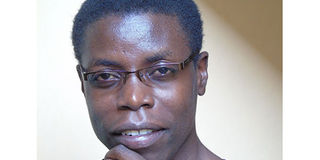BY THE BOOK: Chottohanga Aketch on home and identity

Chottohanga Charles Aketch, a poet, is a teacher of English language and Literature in English at Nyamira Girls School in Bondo, Siaya County. PHOTO| OCHIENG' OBUNGA
What you need to know:
- He was brought up in a polygamous family as a first child to many sisters and brothers, an experience which significantly shaped his anthology of poems The Sun on a Coloured Portrait (2017).
- His other anthology is Purple Bloom (2015). Aketch is also adept in music, drawing and painting.
Chottohanga Charles Aketch, a poet, is a teacher of English language and Literature in English at Nyamira Girls School in Bondo, Siaya County. Aketch has also taught drama for seven years.
He was brought up in a polygamous family as a first child to many sisters and brothers, an experience which significantly shaped his anthology of poems The Sun on a Coloured Portrait (2017). His other anthology is Purple Bloom (2015). Aketch is also adept in music, drawing and painting.
Your anthology, ‘The Sun on a Coloured Portrait’ is heavy with issues of identity
We are formless and meaningless until we find the means of defining who we are. Our experience of ourselves is anchored on the tools handed to us with which we interpret the world and ourselves.
My exploration of these ideas stem from my personal experiences as a person.
As an orphan growing up and not attached to my kindred, I drifted like a wandering cloud in life and found myself sometimes with people who weren't keen on being part of my story in ways that a growing child (and later a teenager) would need during such critical phases of identity crisis and identity formation.
So loneliness stalked me and I felt rootless and insecure for long till I started defining myself and my idea of home in ways I fathomed them from my experiences and how my need for identity and belonging ought to have been against the backdrop of missing parents and separation from siblings.
I use my experiences and struggles to be in the shoes of everyone out there struggling with the same issues.
You look at the Poems Sega Wa, They killed the Green Spirit and Bury me by His Remaining Trees amongst others and you get to feel the urgency of these concerns.
What's the idea of home for you?
It is the physical, spiritual (not religious) and mental spaces we occupy as a people that we have had a chance to thrive in or that have the possibilities of thriving in. The place where we belong and from which we are at ease to stand upon to see the world is home. Usually, the idea exist mostly in the ideal. In reality, environmental degradation and climate change, crippling poverty, marginalization, hopelessness and helplessness, wars, ethnic and political mobilizations and resulting tension, displacement of people from their ancestral lands, family feuds, struggles for available resources, corruption, religious bigotry and sectarianism, state capture amongst many issues have made the concept of home an elusive one to realize. I found home in places (that) and people who accommodated me in the struggles and the warm memories of experiences that became my inseparablecompanions as I struggled to become someone.
Aketch, the poet and the teacher. In what way do the two complement each other?
Teaching rides on my salient passions as a way of sharing the beauty of language, literature and creative expressions.
As a creative and a teacher, how have you impacted your students beyond the classroom syllabus?
I have mentored them to unleash and launch their creative selves onto the highway of established masters in their specific crafts. Many of them have since gone big in their small ways in writing, theatre, music and TV.
How do you handle poetry in class?
I read the poems with my learners to find a reason to enjoy them; as a tool with which we can tour the world through the senses of the poet(s). Only then do I bring the academic aspects forth. I also guide them to explore thoughts and feelings by writing their own poems for appreciation amongst themselves. It helps anchor the mood for positive reception.
What’s next for you?
My third poetry collection is in the pipeline. The previous ones were more of painter's job. I want to delve deeper into matters I'm passionate about some of which appear in the already published works but only superficially.
How do you draw a boundary between your passion and societal concerns?
As a poet there is no boundary between my passions and the societal issues. The society is in me and I am in the society and so we are two sides of the same coin. Therefore, my issues are the society's and the society's mine. My passions are centered on the confluence of all our issues.
Have you tried your hand at other genres?
I have experimented with two which are still too raw to consider at the moment. I am halfway with a novella and there are several unpublished short stories.
How soon should we expect the short story anthology?
It will take a little longer to publish them on my own for I need to work on others to increase the volume, depth and scope of the collection.
What books do you think people should read more in this age?
Books that inspire and guide one to a discovery of themselves and the world. People should read poetry, works of fiction, analytical and philosophical works that rather than provide answers give one the keys to unlock the world.
A few favorite titles?
Imbolo Mbue’s Behold the Dreamers, Adipo Sidang’s Parliament of Owls Tom Burgis’ The looting Machine and V.S. Naipaul’s Miguel Street. I have profound love for Anthony Doerr and his All the light we cannot See




